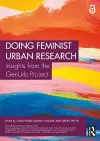
Doing Feminist Urban Research
3 contributors - Paperback
£34.19 was £37.99
Linda Peake FRSC is a professor in the Faculty of Environmental and Urban Change at York University, Toronto, Canada where she was also Director of the City Institute (2013-2023). She is PI on the SSHRC Partnership Grant, Urbanisation, gender and the global south: a transformative knowledge network (GenUrb), a Trustee of the Urban Studies Foundation, and an Associate Editor on the AAG International Encyclopedia of Geography. Her latest publications include the books Urbanisation in a Global Context. 2nd edition (edited with Alison Bain, 2022) and A Feminist Urban Theory for our Time: Rethinking Social Reproduction and the Urban (edited with Elsa Koleth, Gokboru Tanyildiz, Raj Narayanareddy, and darren patrick, 2021), and the forthcoming Elgar Handbook on Gender and Cities (edited with Grace Adeniyi Ogunyankin and Anindita Datta).
Nasya Razavi is a Postdoctoral Fellow with GenUrb (2019-2024) and is lead researcher on the Cochabamba City Research Team (CRT). She is currently the Latin America Program Manager at Inter Pares, a feminist social justice organization based in Ottawa. Nasya completed her PhD at the Department of Geography and Planning at Queen’s University, Kingston, Canada, in 2019, which she has published with Routledge as Water Governance in Bolivia: Cochabamba since the Water War. Nasya adopts a feminist decolonial approach to her work in international development, gender, and environmental and social justice.
Araby Smyth is a Postdoctoral Fellow with GenUrb (2021-2024), researching place ecologies of finance and debt. She completed her PhD in the Department of Geography at the University of Kentucky. Her research has been funded by the Antipode Foundation, National Science Foundation (USA), and Society of Woman Geographers. She has published in geography journals such as Antipode, Environment and Planning A: Economy and Space, and Transactions of the Institute of British Geographers. She is an editor on the Editorial Collective of the journal ACME: An International Journal for Critical Geographies.